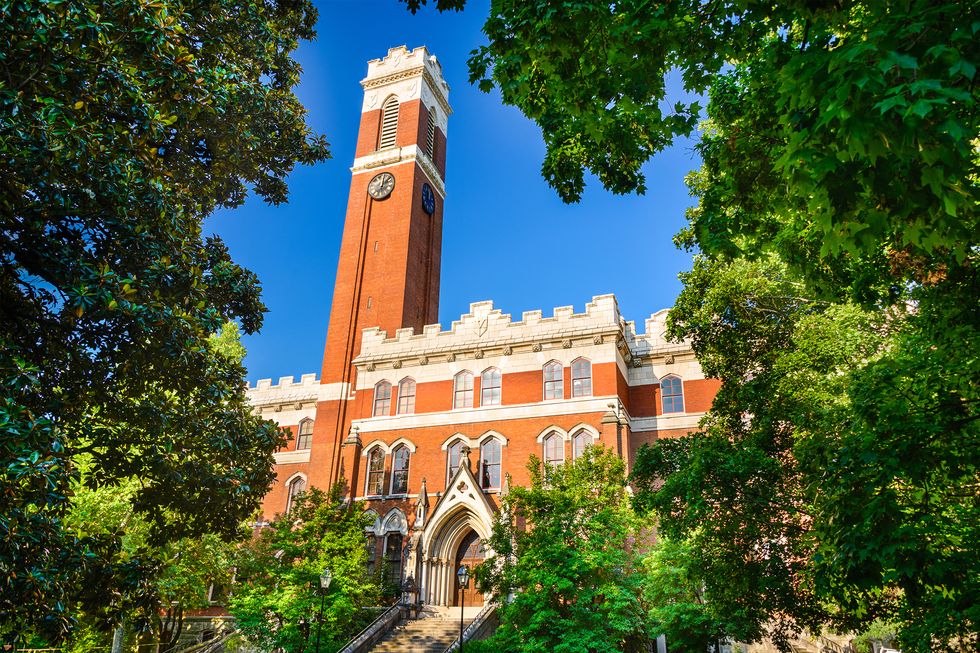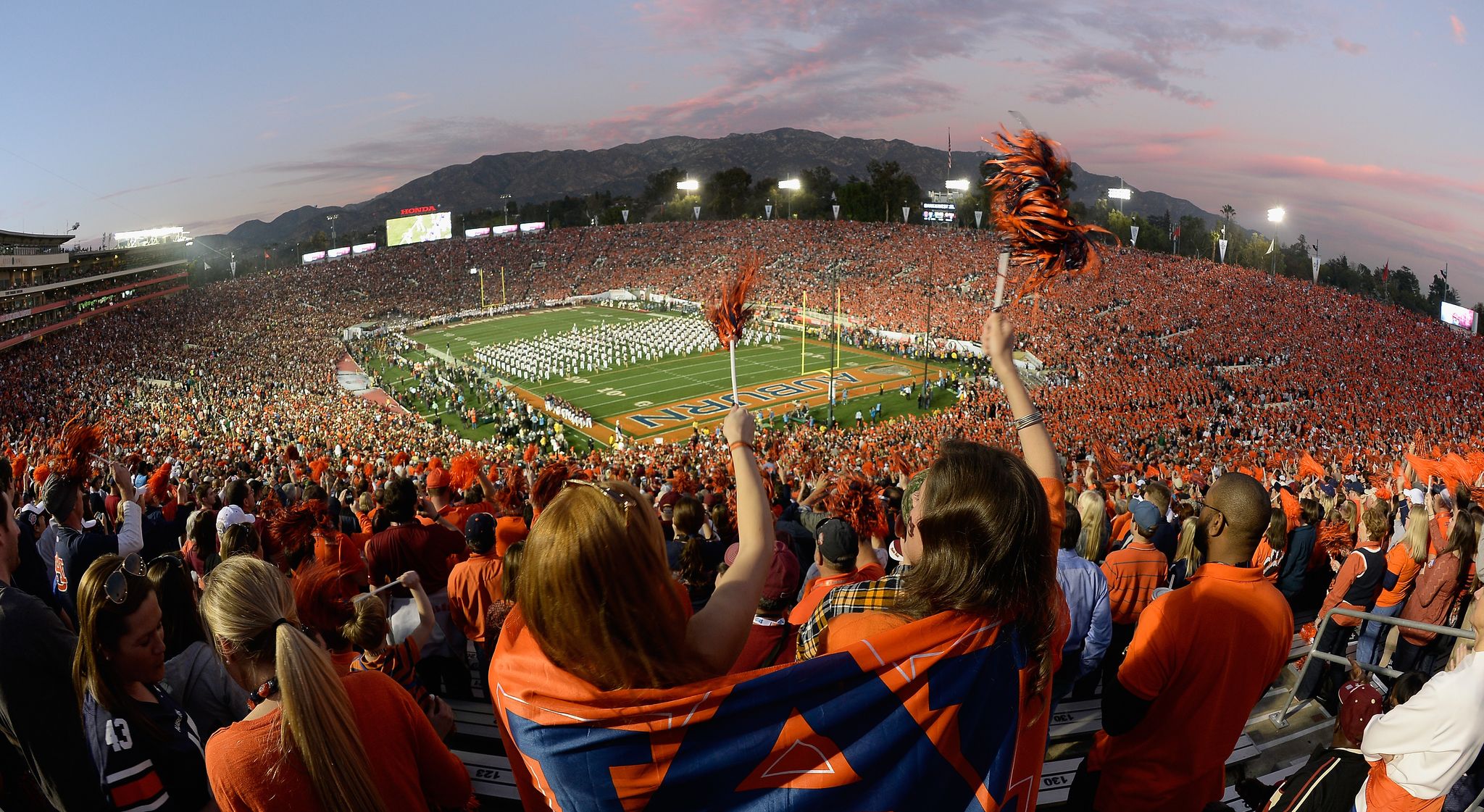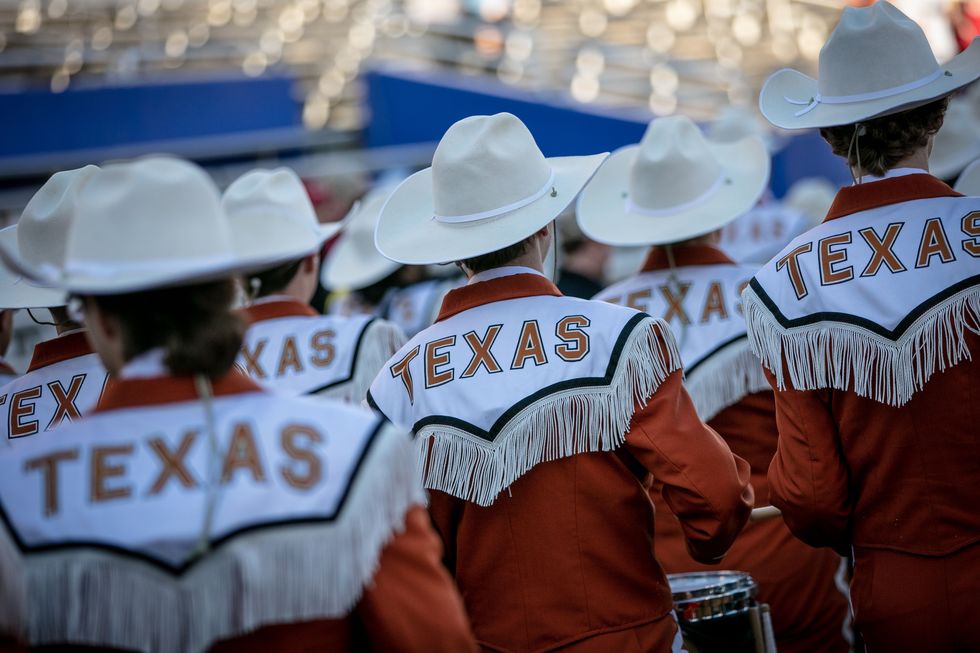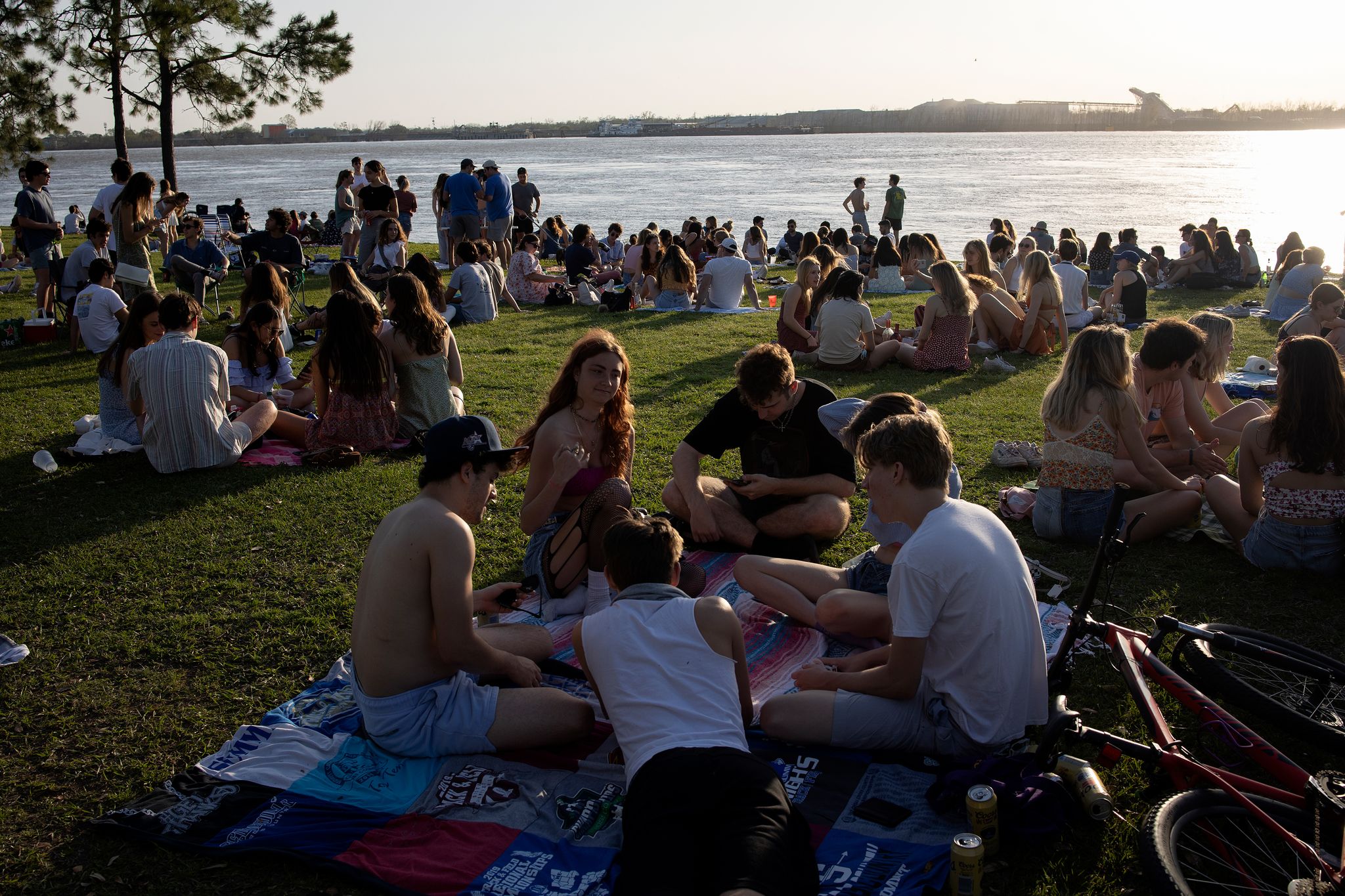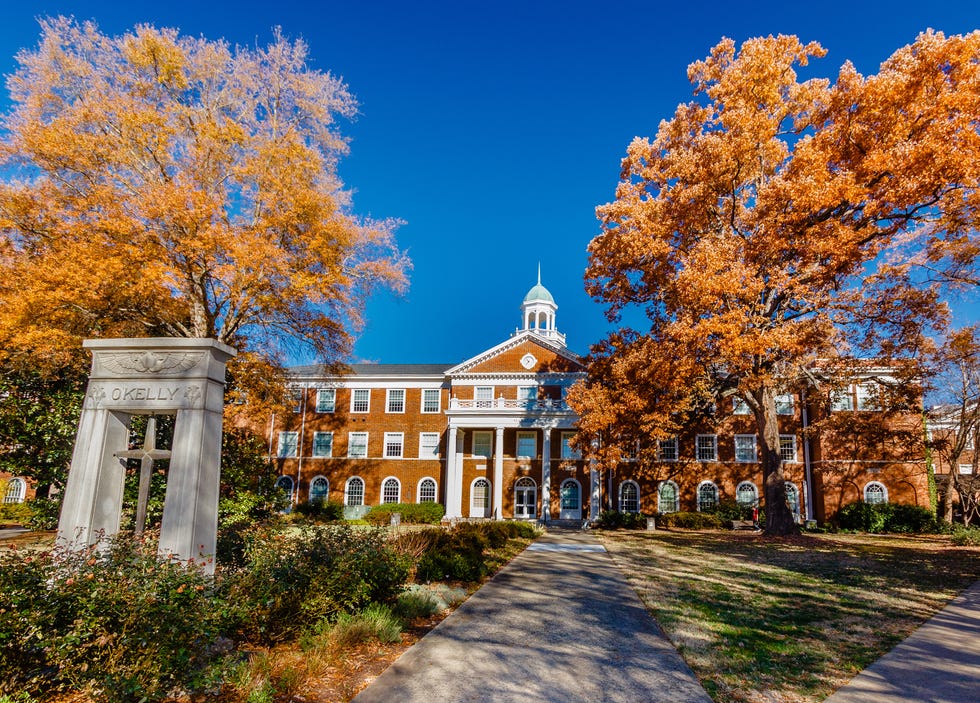Within the fall of 2019, Brennan Vincent was a junior at Mamaroneck Excessive College. Situated within the groaningly rich suburbs of New York Metropolis, Mamaroneck is a top-ranked public college the place, throughout faculty admissions season, “everybody’s aggressive, attempting to get into the identical 5 faculties,” Vincent stated not too long ago.
Certainly, throughout Vincent’s junior yr it was a provided that her friends employed impartial faculty counselors and labored with essay coaches to pave the way in which to acceptance letters from Cornell, Brown, and different top-rated faculties, most of that are situated within the Northeast. “It was a ‘Who are you aware?’ or ‘Who are you aware who is aware of somebody?’ sort of factor.”
The method, Vincent says, was affecting her buddies’ psychological well being, and he or she was vehemently turned off. So when her father, who went to school within the South, advised she take into account Auburn, a public college in jap Alabama, she did. Inside seconds of setting foot on Auburn’s lush, rolling campus—the place stately brick buildings coexist with such world class facilities as a $72 million athletic facility with an enormous, paw-shaped scorching tub (Auburn’s mascot is a tiger)—she was smitten. “Out of all of the campuses I toured it was simply essentially the most lovely. The variety of folks enjoying spike ball, throwing a frisbee, having picnics…” She additionally famous that again dwelling it was a lot chillier. “Everybody simply seemed so joyful” at Auburn. “I used to be like, That is the place I have to go.”
Vincent, who enrolled the next yr in Auburn’s Honors Faculty, the place she’s finding out engineering, could sound like a unusual outlier: a New Yorker who decides to go rogue and attend a school in a deep crimson state that has a decent 99 rating amongst nationwide universities on the sacrosanct U.S. Information and World Report faculty record. However she is a part of a rising pattern amongst highschool college students in liberal hubs like New York, Boston, Los Angeles, and Chicago who’re deciding to forgo the aggressive, cutthroat environments of Colgate and Columbia for the extra rah-rah vibe of locations like Auburn, Southern Methodist College, Texas Christian College, Clemson, the College of Miami, and different Southern establishments which have historically been written off by coastal snobs as football-and-frat-party faculties that allow anybody with a measurable GPA of their doorways.
57%
Fall 2021 freshmen at TCU who got here from out of state— up from 30 % in 2008.
Some Southern universities—Tulane, Emory, and Vanderbilt, for instance—have lengthy attracted a gradual stream of non-Southerners because of reputations as rigorous faculties in cool locations. Emory is taken into account a sort of Williams Faculty situated in a hip a part of Atlanta versus the Berkshires. Vanderbilt, within the coronary heart of Nashville, is a work-hard-play-hard sibling to Dartmouth. (Some discuss with “Vandy” as “the Harvard of the South” resulting from its brick-and-ivy campus.) And the College of Texas at Austin, a public Ivy situated within the proudly left-of-center Texas capital, “is the UCLA of the South,” says Jennifer Kaifesh, an impartial faculty counselor in Los Angeles. North Carolina has its personal broadly interesting, and extremely selective, gems within the type of Duke College and the College of North Carolina at Chapel Hill. These faculties usually are not considered Southern Southern; the most important subset of Tulane’s class of 2026—30 %—is from the Northeast.
What’s totally different now’s that lower-tier Southern faculties have began to enter this fascinating group. Fifty-seven % of the incoming freshman class at Texas Christian College, a midsize college in Fort Value—the place college students stroll round in cowboy boots on the mornings of college soccer video games and down BBQ and queso on the Stockyards, a preserved Western district on the town—are from out of state. Seventeen % of these hail from California. Examine that to 2008, when greater than 70 % of TCU’s incoming freshmen have been from Texas. Thirty miles down the highway, at Southern Methodist College, a $79,000-a-year, Tara-like oasis in the course of Dallas well-known for boulevarding (high-class tailgating) and alums like Bumble co-founder and CEO Whitney Wolfe Herd, 62 % of this yr’s incoming freshmen are from out of state.
The honors packages at Southern faculties are additionally drawing out-of-staters. Sarah Langford, an impartial faculty counselor in Chicago, says a pupil she labored with not too long ago turned down an Ivy to attend the Honors Faculty on the College of South Carolina, the place the admitted college students have a mean weighted GPA of 4.7. “She wished the complete faculty expertise however nonetheless wished to get the wonderful teachers.”
There are clear and sensible causes for this shift. It’s no secret how prohibitive entry into selective faculties has develop into, significantly as so many went test-optional in the course of the Covid pandemic, sending utility numbers hovering. Harvard’s acceptance charge sank to an all-time low of 5 % in 2021. Even the College of Southern California, as soon as dubbed the College of Spoiled Youngsters, is now a High 30 college that claims sure to only 16 % of those that apply. The result’s that faculties like SMU, which accepts roughly half of its candidates, are now not thought of security faculties for aggressive college students however have develop into “doable” and even “attain” selections. Ditto for TCU, which had a 53 % acceptance charge in 2021. Jill Stuart, a USC alum residing in Los Angeles, says that when her twin sons have been making use of to school they didn’t even take into account her alma mater, as a result of “it’s gotten so tough to get into, and my youngsters weren’t at that tutorial caliber. It will have been some type of deferred or transfer-in state of affairs, and so they very a lot wished to set foot in a dorm the autumn of their freshman yr.” Her sons each enrolled at TCU.
These faculties hit the candy spot of being simpler to get into than the Ivies however not simple, in response to Langford. “I feel something with that 45 % acceptance charge or greater—however not 80 %—makes college students really feel like, Okay, I’m going to a extremely good college that I can perhaps get into,” she says.
There are additionally extra nuanced causes behind the brand new Southern migration. College students in locations with the strictest Covid protocols, such because the Northeast and California, spent nearly a full yr of highschool on Zoom, lacking out on proms and IRL graduations. Schools and universities in these areas additionally went on-line for prolonged lengths of time. However within the South, the place insurance policies have been far much less stringent and face masks turned a lightning rod challenge (and a logo of the raging tradition divide on this nation), many faculty campuses have been solely briefly closed. By the point Vincent arrived at Auburn within the fall of 2021, she says she was going to soccer video games “with 90,000 folks.” Life “felt prefer it was 2019 over again.”
The tradition wars have been manifest in additional fraught methods as properly. As protests concerning the homicide of George Floyd rocked the nation within the spring and summer time of 2020, and broad discussions about racial fairness turned a part of the nationwide discourse, many secondary faculties, significantly elite impartial establishments, rethought their curricula. Books that have been deemed culturally insensitive have been taken off studying lists, and a brand new focus was placed on inspecting and discussing racism. Some conservative households felt that all of it went too far. The battle bled into headlines: There was the Brearley dad who yanked his daughter out of the varsity and wrote a letter to different mother and father urging them to equally withdraw their youngsters from a spot that was “brainwashing” youngsters with a “woke ideology.”
This dynamic has begun to infiltrate the faculty admissions cycle, as conservative households take into account what sort of environments they need for his or her youngsters after highschool. Liberal elite faculties, as they see it, promise solely extra wokeism. Why not ship their youngsters to a spot that’s extra about Greek life than social justice seminars?
Christopher Rim, founder and CEO of Command Schooling, an impartial faculty consulting firm with places of work in New York and Miami, says {that a} household with youngsters on the prestigious Dalton College in Manhattan not too long ago shifted their focus away from faculties like Stanford, Duke, and Georgetown to Washington College in St. Louis, Emory, and SMU. “They are saying they need a college the place ‘You see a way of neighborhood and the place you’re actually capable of have debates and have conversations with opposing viewpoints and never be canceled,’ ” says Rim, whose charge is $1,500 an hour. “I’ve by no means despatched youngsters to go to SMU earlier than, until they lived in Texas,” he provides. “Now we now have youngsters from Dalton making use of.”
$450M
Quantity SMU is elevating to extend need- and benefit primarily based scholarships.
Rim’s expertise illustrates how a lot the tradition wars are affecting discussions about greater schooling. These conversations have develop into all of the extra heated as eruptions over race, gender id, and freedom of speech have been rocking faculty campuses. In 2017 protests at UC Berkeley over an look by right-wing commentator and Breitbart Information editor Milo Yiannopoulos became riots involving Molotov cocktails and pepper spray. Earlier this yr at Yale Regulation College, a panel attended by conservative constitutional rights litigator Kristin Waggoner was disrupted by jeers and what Waggoner described as “bodily intimidation.”
The impact, although, could be difficult. For some households a complete escape from so-called liberal thought pockets is the objective. However there are additionally college students who, whereas in search of a much less politically charged (or simply extra easygoing) surroundings in faculty, discover themselves butting up in opposition to different extremes at Southern universities, lots of which lean conservative. Accustomed to liberal metropolises like Manhattan and L.A., they discover themselves in one other enviornment of thought and politics—particularly since Roe v. Wade was overturned in June. Stricter abortion legal guidelines are already in impact in states like Texas, Florida, and Alabama.
Arthur Troy, who attended Harvard-Westlake, an esteemed impartial college in Los Angeles, after which went to SMU, says, “My sense of my liberal, progressive politics simply felt so common at Harvard-Westlake and in L.A. I used to be like, Oh, everybody has human rights. Girls ought to have healthcare—after all! It didn’t make sense to me that there was something loopy happening till I acquired to campus and there’d be Donald Trump Jr. talking, or [conservative comedian] Steven Crowder.”
Nonetheless, he admits, “It sort of activated a political aspect of me, which I truly preferred. Despite the fact that I disagreed with many issues, I’m grateful for that publicity to one thing totally different.”
Within the polarized America of proper now, the time period neighborhood is an influenceful elixir in terms of attracting college students to school campuses, and it’s tapping right into a advertising playbook that Southern faculties have lengthy labored from, significantly faculties recognized for football-centric, school-spirit identities.
“College students reside in neighborhood right here and be taught in neighborhood, in order that’s an vital a part of our secret sauce,” says Kathy Cavins-Tull, vice chancellor for pupil affairs at TCU. She cites the varsity’s comparatively small courses (25 to 30 college students), that are taught by college versus graduate college students or instructing fellows.
“It’s simply very mellow, and everybody’s pleasant,” says Austyn Davis, who was certainly one of six ladies who graduated from Marymount Excessive College, an all-girls Catholic college in Los Angeles, and went to TCU in 2021. One other six went to SMU. “It’s very totally different and really comparable in numerous methods to L.A. There are soccer video games and a rustic feeling. On the identical time, I didn’t really feel misplaced or that I needed to change something about who I’m.”
TCU’s emphasis on lively engagement and socialization remained alive and properly in the course of the early days of Covid, additional boosting its attraction to college students who spent a lot of highschool on Zoom. Courses went on-line within the spring of 2020, however within the fall college students have been welcomed again into the classroom (that they had the choice to remain on-line). TCU even rented furnishings and arrange outside lounges with Tivoli lights, firepits, and big-screen TVs the place youngsters may hang around.
Jeff Stuart, who graduated from TCU final spring, says that within the fall of 2020 “nearly each weekend buddies from USC, Boulder, Cal Berkeley—anyplace within the nation—could be flying out to return see us as a result of they knew we have been open.”
In some sense, the normality that so many younger folks crave is embodied within the fundamental traditions of wildly Instagrammable Southern faculties: the soccer video games, the tailgating, the liberty to dedicate as a lot time and vitality to dashing a fraternity or sorority as acing microbiology. Even orientation appears extra enjoyable. Whereas incoming Georgetown freshmen may take part in a program in August the objective of which was “to focus on the vibrancy of the DC neighborhood by means of volunteer activism and significant engagement with companions as a option to discover social justice points, frameworks of solidarity, and pathways for social change,” TCU’s orientation consisted of “small group discussions, staff constructing train, ice breakers, board video games, cheers, garden video games…and, after all, dancing.”
However beneath the postcard high quality of Southern faculties, there’s usually a fancy social cloth, significantly at faculties in cities which have developed over the previous few a long time because of rising industries which have attracted a extra geographically and ethnically various inhabitants. Atlanta, dwelling to main companies like Coca-Cola and Delta, now has a booming tech and concrete music scene. It’s additionally the place the Marvel films have been shot since 2014, and it’s dwelling to the Facilities for Illness Management and Prevention.
Such shifts have bled onto faculty campuses, which by their nature exist as extra culturally liberal bubbles inside bigger environments. “Each place I’ve taught has been surprisingly [ideologically] various,” says Michael Phillips, Clements Senior Fellow for the Research of Southwestern America at SMU.
Phillips began his profession as an adjunct professor at UT Austin, then labored at Collin Faculty in Plano, Texas, earlier than becoming a member of SMU. “Once I was asking professors to signal an open letter about taking down Accomplice monuments in Dallas, saying that they have been icons that promoted white supremacy, I had some professors I contacted at Dallas-area faculties who have been actually offended by the thought… However then I acquired a really giant quantity who did signal it. So it’s a spectrum.”
This spectrum is propelling curiosity in faculties that households would possibly in any other case dismiss for the politics of their dwelling states. As Langford says, “A college just like the College of Miami, though it’s in a conservative state, is pulling youngsters from all around the nation. So numerous households can rationalize that and say, ‘I’m sending you to a conservative state, however you’re going to be surrounded by folks from all around the nation and world.’ ”
Nonetheless, some college students who head south for faculty expertise a degree of tradition shock, however they be taught to manage by maintaining quiet or specializing in nondivisive points of school. When Seamus Tingle was a junior at Boston Faculty Excessive College, a Catholic prep college, he visited a pal on the College of Alabama for a soccer weekend. “The whole quad turns into an enormous tailgate,” he says. “They’re organising tents and grilling, watching different video games within the tents. For somebody who has by no means seen any of that, this seems like a lot enjoyable.”
He utilized and acquired in, however issues have been totally different as a pupil. He discovered himself rooming with “three youngsters from Alabama. All of them went to highschool collectively and have been all in the identical church group. They have been super-nice guys, nevertheless it was simply utterly totally different.”
He additionally discovered that his political and social views, which had at all times been “extra reasonable than the common individual in Cambridge,” have been thought of far left down south. “If we have been ever speaking about politics, I used to be the Democratic consultant in these discussions.”
Arthur Troy had a extra caustic response when he arrived from L.A. at SMU. He recollects the group chat for his fraternity, Sigma Phi Epsilon, as being “laced with excessive” feedback. “It was meant to be comedy, however the excessive nature of it generally went too far. It was folks posting conspiracy theories for enjoyable and speaking about Pizzagate and shit.”
In fact, tradition shock works the opposite means round, too, and the picture of Southerners who enterprise to the chilly, bitter North for faculty solely to be met by cultural snobbism and insulting assumptions about their identities is itself a stereotype. Mary Bray Erickson, who grew up in Winston-Salem, North Carolina, and was the one individual in her pal group to go away the South for faculty (she went to Cornell), recollects casually saying “Hey” to a man in her freshman dorm whereas passing him within the hallway. “He stops in his tracks and goes, ‘Do I do know you?’ ” Erickson says. “It felt like whiplash to me. In North Carolina you greet everybody as if you recognize them. You by no means say, ‘It’s good to fulfill you.’ You say, ‘It’s good to see you,’ since you is probably not positive if you happen to’ve met the individual earlier than.”
For some college students who head south, the shortage of range not simply of opinion however of pores and skin coloration is what stands proud most about their expertise, significantly at non-public establishments that have a tendency to draw a whiter, wealthier inhabitants. One latest graduate of SMU who’s Asian-American (she didn’t want to be recognized) says she observed this throughout her first week. “There was a retreat for incoming freshmen,” she says. “All of us had flashlights and have been in a darkish room, and also you needed to shine the sunshine if you happen to recognized with the Hispanic neighborhood or African-American, etcetera. There have been a disturbingly low variety of lights shining. I’m speaking, like, six in a room filled with 1,000 folks.” When individuals who recognized as Asian have been requested to activate their flashlights, “It was mainly me and my roommate.”
62%
Share of out-of-state SMU undergrads, with California first and New York fourth.
SMU’s Wes Waggoner, who runs the varsity’s enrollment, says that at SMU, which is 61 % white, there’s a top-down dedication “to guarantee that that is an inclusive campus and that every one college students really feel like they will succeed.” He factors out that in 2020 the college appointed its first chief range officer and is elevating $450 million to supply extra need- and merit-based scholarships to draw college students who wouldn’t ordinarily have the ability to attend.
Not that discussions about gender or id politics or range are absent at these faculties, significantly these with higher concentrations of scholars from across the nation, equivalent to Elon College in North Carolina. Elon’s high states for incoming freshmen are North Carolina, Massachusetts, New Jersey, and New York.
Téa Valette, a Boston native who went to boarding college in New Hampshire, says that at Elon folks do convey up race. “I used to be not as uncovered [to conversations about race] as I’d have been in Boston, however I went to the Raleigh girls’s march for BLM,” she says. “There have been numerous posters round Halloween that stated, ‘Our Tradition’s Not Your Costume.’ It’s what you expose your self to.”
For some conservative-leaning households, many Southern faculties’ literal and figurative distance from what they describe because the “woke” wave in components of the nation has develop into an enormous promoting level. (Final yr former New York Occasions op-ed columnist Bari Weiss seized this area when she introduced she was founding a brand new, anti–cancel tradition faculty, the College of Austin.) These households wish to keep away from environments the place conservative audio system are shouted down and the place an anti-fragility ideology prevails (to make use of the phrases of The Coddling of the American Thoughts authors Greg Lukianoff and Jonathan Haidt).
Some discover the declare that households are avoiding hotbed campuses in favor of locations the place there’s a extra equitable backwards and forwards disingenuous. “Once I hear folks say, ‘I don’t need my baby in an surroundings the place they’ll be focused for his or her beliefs’—nobody desires anybody to be focused for his or her beliefs,” says Marcia Chatelain, a professor of historical past and African-American Research at Georgetown College. “However what it usually is masking is a substantial amount of anxiousness that when conventional faculty college students between 18 and 22, particularly these from middle- and upper-class households, go to school, they are going to begin to query the ideologies they grew up with—whether or not it’s about race, whether or not it’s about wealth, whether or not it’s about gender or sexuality. And so what has grown out of it’s a cottage trade grievance tradition of books and articles, and this ridiculous College of Austin experiment, during which individuals are legitimating a set of fears that, in actuality, are by no means truly absolutely articulated.
“This concept that the very expertise that’s speculated to open up your perspective and your views on the world can now be tailor-made much more to contribute to your already held beliefs is admittedly upsetting. And the truth that this will truly work reveals you simply how little progress has been made on and off a school campus.”
Politics could as soon as once more radically have an effect on the reputations of colleges in states like Texas, Florida, and Alabama, as a result of overturning of Roe v. Wade by the Supreme Court docket. Christopher Rim, the faculty counselor working with the household at Dalton, says that after the ruling was introduced he obtained a textual content message from the daughter who was planning to use to SMU. She informed him she now not wished to use to any faculty in a state that had abortion restrictions.
Elena Hicks, SMU’s dean of admissions, says this sort of response is one thing she’s attempting to right. “When legal guidelines and/or insurance policies change” in a state, the hope is that “you don’t really feel like, I can by no means go to that state, or I can by no means go to that metropolis. There are folks of all views and walks of life that make up who we’re in Dallas, and at SMU and within the state of Texas.”
When requested whether or not the Roe v. Wade ruling would have an effect on her emotions about Auburn, Vincent says, “There have been already fairly strict legal guidelines [in Alabama] earlier than. It doesn’t change my opinion of the varsity in any respect.”
Within the meantime, there are different issues to concentrate on. Vincent’s pal from Colgate was coming down in late September for homecoming weekend, when “on Friday evening there’s a parade all through the entire city with the candidates for homecoming queen. I by no means had a homecoming queen in highschool; it’s unusual to be seeing that in faculty. There are these large floats that the sororities make,” she says. “It’s so bizarre, however on the identical time it’s a lot enjoyable. It’s like being a vacationer in your individual city.”
This story seems within the October 2022 challenge of City & Nation. SUBSCRIBE NOW
























































